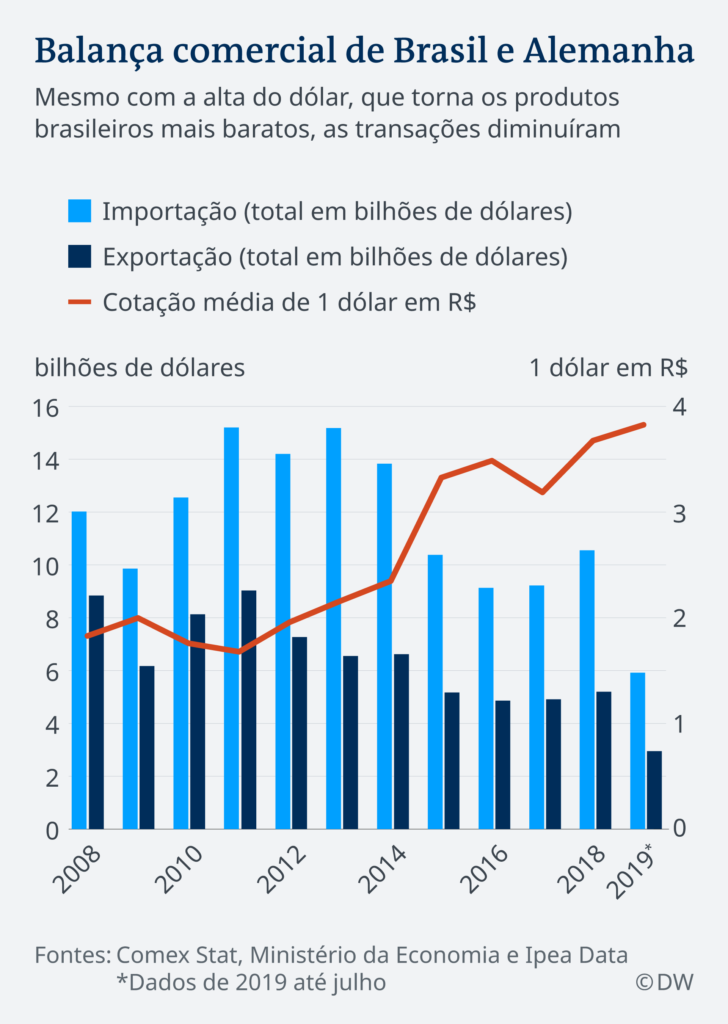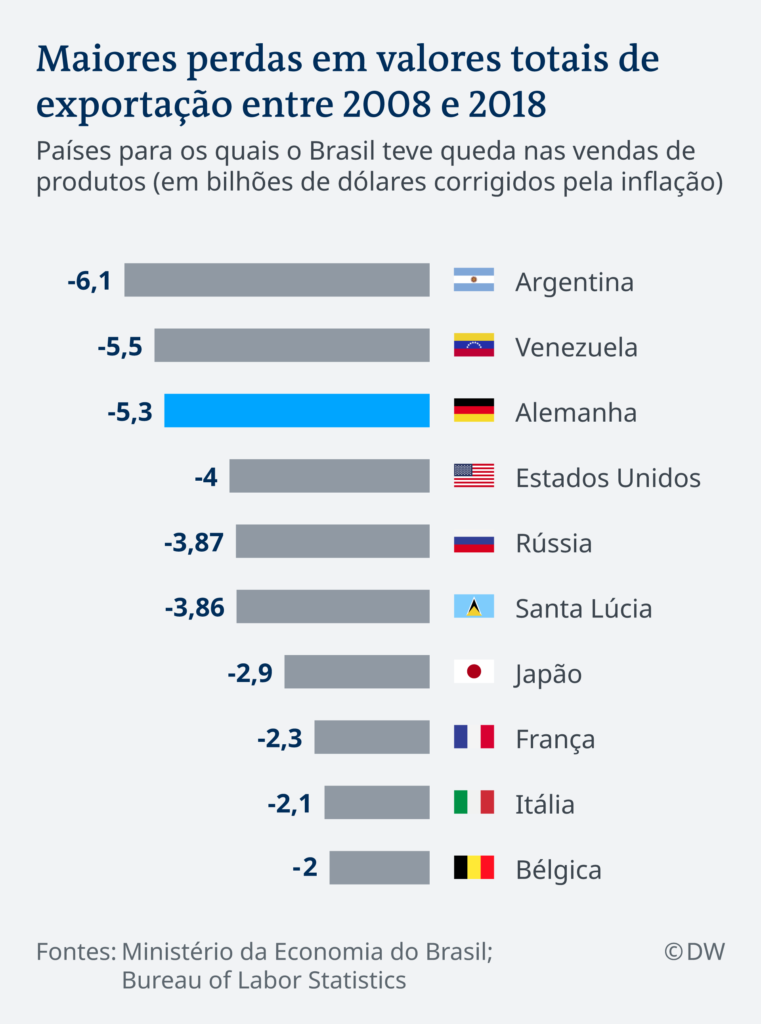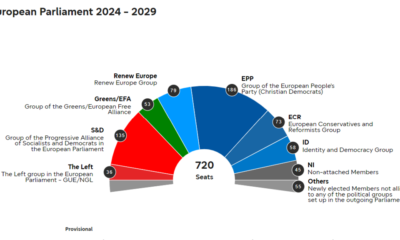Data Journalism
Deutsche Welle: Could disagreements between Brazil and Germany affect trade?
In 10 years, Brazil has lost its position as Germany’s main trading partner in Latin America


Originally published in Deutsche Welle on 21/8/2019
Click to see the original post
In ten years, Brazil has lost its position as Germany’s main trading partner in Latin America. Disagreements over the protection of the Amazon could further damage Brazil’s position, say experts
Exactly ten years ago, Brazil and Germany were celebrating the strengthening of their trade relations. Trade between the two countries had more than doubled between 1998 and 2008, from 8.4 billion euros to 18 billion euros. A decade later, trade between the two countries fell to 16.9 billion euros, according to Germany’s Federal Statistical Office (Destatis). Now, there are fears that diplomatic friction will spill over into economic relations.
At the beginning of August, Germany’s Environment Ministry announced that it would suspend the donation of 35 million euros (around 157 million reais) intended to finance projects to protect the Amazon. In a tone of contempt, Bolsonaro replied that “Germany will no longer buy the Amazon“. He also told the German Federal Chancellor, Angela Merkel: “take that money and reforest” your own country.
The Germans also expressed their dissatisfaction with the unilateral changes promoted by the Bolsonaro government in the management of the Amazon Fund. This is a billion-dollar forest conservation program whose financing is mostly funded by Germany and Norway. The German embassy in Brasilia has already admitted that the impasse could lead to the end of the fund. The Norwegians have canceled new contributions.
Oliver Stunkel says Brazil’s position is one of isolation
Experts interviewed by DW Brasil say that diplomatic friction tends to have economic effects in the medium term. In the assessment of Oliver Stunkel, professor of International Relations at the Getúlio Vargas Foundation, the Brazilian government’s stance creates the risk of isolating the country on the international stage, with consequences in several other areas.
“The Amazon Fund is one of the pillars of this relationship, and now it has fallen. It’s an indication that there may be fewer points of dialog. I have my doubts about how many times there will still be dialogue in areas such as science and technology. I see the country going through a very difficult time.” Oliver Stunkel, professor of international relations at fgv
According to experts, in the medium term both the free trade agreement between Mercosur and the European Union and the country’s entry into the Organization for Economic Cooperation and Development (OECD) could be affected. Signed in June, the European Union-Mercosur agreement is awaiting ratification by the parliaments of the member countries of the blocs.
Brazil’s environmental stumbling blocks could hinder agreement
Betina Sachsse, manager for Brazil at the Lateinamerika Verein, an association of German companies focused on Latin America, points out that France, Ireland and Hungary are some of the countries where agriculture is strong. They have sectors that they fear will be harmed to the benefit of South American producers. Brazil’s stumbles in the environmental area could serve as a political argument to postpone or not ratify the agreement.
In the case of the candidacy for the OECD, the advance of deforestation in the Amazon and the apparent neglect of the Brazilian government could be seen by developed countries as a lack of willingness to comply with the Paris Agreement, signed in 2015 to reduce greenhouse gases.
“The two great powers of the European Union, France and Germany, have a very strong understanding of the environment, and it may be that markets will be closed to Brazilian agribusiness. But I think there is still room for this to be mitigated. So far, it seems to me that these tensions are in the realm of rhetoric.” Luiz felipe brandão osório, professor of international relations at Ufrrj
Luiz Felipe Brandão Osório, professor of International Relations at the Federal Rural University of Rio de Janeiro (UFRRJ), researches the economic relationship between Brazil and Germany in the 20th and 21st centuries.
Germans are pragmatic in trade relations
For Germany, says Sachsse, politics and economics usually go hand in hand. That’s why noises in the diplomatic field don’t have an immediate impact on trade relations. But she ponders whether Bolsonaro’s statements have only been aimed at the environment or whether they sound like hints to other areas, such as human rights. This could affect the image of German companies operating in Brazil.
In 2016, the German government adopted the National Action Plan for the Implementation of the United Nations Principles for Business and Human Rights (NAP). The document sets out guidelines for companies in the country to respect human rights and the environment throughout the production chain. Adhering to the plan, for the time being, is a voluntary act. But Sachsse says that it should become compulsory. In this case, German companies doing business in Brazil could be penalized if they have relationships with Brazilian suppliers who fail to comply with these guidelines.
Trade balance and relations cooled five years ago
Economic ties between Brazil and Germany have gone through three distinct cycles in the last 100 years, says Professor Osório. In the first stage, in the 1930s, there was a rapprochement between the two countries to strengthen Brazilian industrialization. In the 1970s, Germany cooperated in programs such as the Angra dos Reis nuclear power plants. In the third cycle, under former president Luiz Inácio Lula da Silva, contact between the two countries became more intense. There were partnerships signed in the scientific, technological and environmental fields.
Brazil’s trade balance has seen the real impact of these relationships, according to data from the Ministry of Economy. After peaks in transactions in 2011 and 2013, when imports and exports between Brazil and Germany reached their best moment, performance gradually retreated.


The sale of Brazilian products to Germany shrank from 8.8 billion dollars in 2008 to 5.2 billion in 2018. The partnership between the two countries represented the third biggest loss in total values for Brazil, behind only trade with Argentina and Venezuela. Corrected for the dollar inflation index between 2008 and 2018, the negative balance from one year to the next is equivalent to 5.3 billion dollars today.


Imports of German products fell from 12 billion dollars to 10 billion dollars in the period, with a negative balance of 3.8 billion dollars, adjusted for dollar inflation, between 2008 and 2018.


German companies waiting for reforms
Even so, Germany is still Brazil’s fourth main trading partner, behind China, the United States and Argentina, according to the Ministry of Economy.
On the German side, Brazil is currently 29th in the trade ranking and has lost to Mexico the leadership among Latin American countries that it held in 2008, when it was 21st in the overall ranking of economic partners.
For Sachsse, of the Lateinamerika Verein, in addition to Brazil’s instability in recent years, one of the reasons for the loss of space in trade with Germany is the growth of China, which has increased its share of both the German and Brazilian markets.
But according to the institution, Brazil is still attractive to German companies, especially in the health sector, such as medicines and medical equipment, where public and private demand is still on the rise.
“If you forget the political discussions and look at the economic figures, everyone is in a waiting position.” Betina Sachsse, manager for Brazil at Lateinamerika Verein
Many companies are showing interest in investing in the country, such as those in the automobile sector, but they are waiting for the reform agenda, such as the pension and tax reform, and an improvement in economic indicators, he points out.
Read also:
- Deutsche Welle: “The Real Plan was half a copy of the German model”
- 6 Valuable Tips for Building a Successful Journalist’s Portfolio
- Deutsche Welle: “Plano Real foi uma cópia do modelo alemão pela metade”
- Deutsche Welle: Brasiliens neuer Präsident Lula da Silva: Totgeglaubte leben länger
- Deutsche Welle: Tem parente alemão? Saiba se você tem direito à cidadania
- Deutsche Welle: Cresce número de brasileiros com cidadania alemã
- Deutsche Welle: Em 15 anos, 170 mil brasileiros obtiveram cidadania europeia
- Deutsche Welle: Como se tornar um turista sustentável
- Deutsche Welle: “Bolsonaro ignora o meio ambiente e o que a ciência diz”, afirma Thomas Lovejoy
- Deutsche Welle: O potencial turístico de unidades de conservação no Brasil
- Deutsche Welle: Discordâncias entre Brasil e Alemanha podem afetar comércio?
Back to Home | Back to Portfolio | Back to Latest


-





 Articles2 years ago
Articles2 years ago2024 European Elections: Check the results by country in charts and maps
-





 Articles2 years ago
Articles2 years ago6 Valuable Tips for Building a Successful Journalist’s Portfolio
-





 Data Journalism2 years ago
Data Journalism2 years agoDeutsche Welle: “The Real Plan was half a copy of the German model”
-
Academia1 year ago
Using topic modeling to analyze freedom of information law requests
